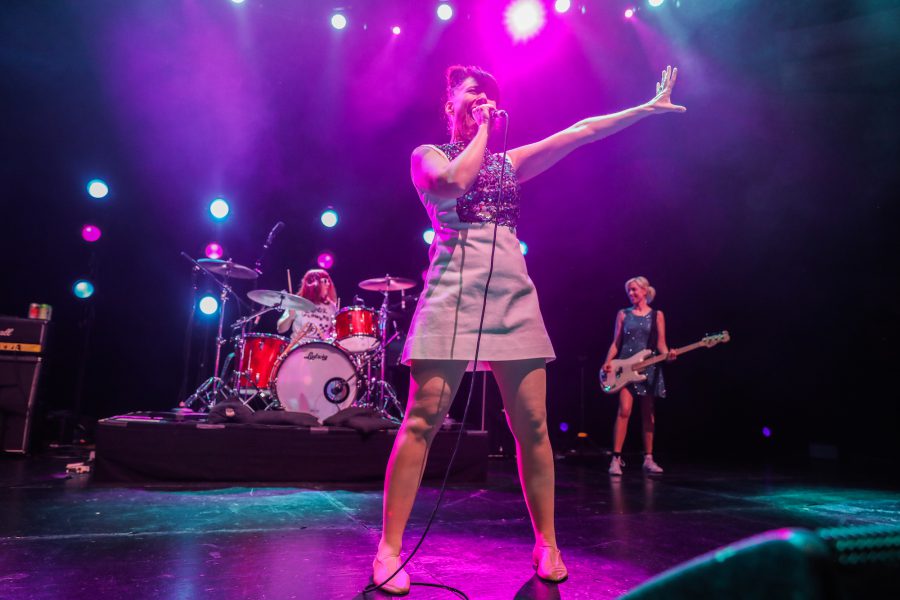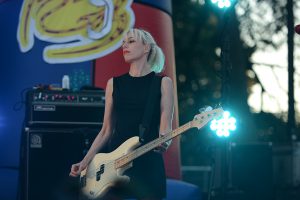INTERVIEW: Rebel girls Bikini Kill enjoying the limelight, ready to make a new statement

Bikini Kill, courtesy Debi Del Grande. Mosswood Meltdown photos: Roman Gokhman/STAFF.
Riot grrrl originators Bikini Kill didn’t purposefully wait three decades to make their late-night TV debut. They weren’t holding out on principle of not selling out or due to their ethos as a punk band. In fact, drummer Tobi Vail said in a recent video call that it had been her dream to play “Saturday Night Live” one day.
Bikini Kill
8 p.m., Sunday, Aug. 18 and Monday, Aug. 19
The Warfield
Sunday tickets: $61. (GA balcony only left)
Monday tickets: $61-$99.
The reason the band’s first opportunity came on “The Late Show with Stephen Colbert” recently is much simpler: They didn’t get any offers.
“When we were a band in the ‘90s, we didn’t have a manager,” Vail said a few days before the Olympia, Wash.-originated band was due to start their last set of reunion headlining shows in North America. “Unless there was like a publicist for a certain album or something—and that would have just been probably my sister at Kill Rock Stars—we did everything ourselves, so we didn’t have those kinds of opportunities. You kind of have to have management, or a booking agent, or something like that. We didn’t have any of that.”
Vail credits the Colbert chance on frontwoman Kathleen Hanna’s recently released memoir, titled “Rebel Girl: My Life as a Feminist Punk” after Bikini Kill’s underground rallying cry, for the gig. The book made the New York Times list with its stories of traumatic childhood and sexual abuse, Hanna’s and the band’s work as feminist punk rockers, and Hanna’s private marriage to the Beastie Boys’ Adam “Ad-Rock” Horovitz and their adoption of son, Julius.
The “Rebel Girl” song never lost steam, even as the band called it quits after seven years in 1997 due to burnout from hostile treatment and outright sexist hate from some, as well as critical backlash from a second front of feminists accusing Hanna, Vail, bassist Kathi Wilcox and then-guitarist Billy Karren—but mainly Hanna—of what Vail referred to as “not doing feminism right.”
“Some of our shows were great, and that was true from the beginning,” Vail said. “Kathleen … had a lot harder time than us because she was very vulnerable by being the front-person, and she was doing a lot of rape survivor counseling, sexual assault survivor counseling, informally, pretty much at every show. She was hearing these horrific stories that were being told to her by teenage girls coming to see us as a kind of refuge, or queer teens who had no place to go.”
In her memoir, Hanna details several instances where she herself was raped, and explains that she doesn’t cover every instance. Bikini Kill infamous dealt with sexist insults, attacks from the left saying that Hanna was not a real feminist, and an indifferent and sometimes malicious music press.
“One of the things that really sucked was there was violence at our shows and not a lot of security, and not really even a backstage most of the time,” Vail said. “We could have done things differently, but we were a DIY punk band, so that was just kind of the reality.”
The band ended on rocky terms, with the members going their separate ways. Hanna later found success with electronica solo project The Julie Ruin and electro-punk band Le Tigre with Johanna Fateman and Sadie Benning. Wilcox and Vail, a zine creator whose writing spurred on the creation of Bikini Kill and who coined the term “riot grrrl,” also continued to play. Then Hanna was diagnosed with Lyme disease, which left her unable to perform.
The idea for a reunion was originally set in 2017 when the trio, now all in their mid-50s, agreed to play a song at a celebration for 1970s punk band The Raincoats in New York. That rekindled their friendship, and the band played shows in New York, L.A. and London in 2019. A larger tour was lined up for 2020, but everyone remembers how that year turned out. The lineup now also includes guitarist Sara Landeau, who played with Wilcox and Hanna in The Julie Ruin.
Vail, who’d quit her day job in anticipation of the 2020 tour, said the pandemic has actually extended the band’s reunion longer than it otherwise might have lasted.
“We had to reschedule several times, and then in 2022, we all got COVID on different legs of the tour and had to reschedule that again. We didn’t even complete the tour that was booked in 2019 until 2023,” she said. “When that was over, it was like, ‘Hey, you wanna do some more shows?’ … I think this [current tour] is it, at least for now.”
Vail and Hanna’s friendship and musical connections go way back. Vail briefly dated Kurt Cobain. Hanna gave Cobain the inspiration for the title to “Smells Like Teen Spirit” by scribbling on Cobain’s wall. And both ladies look up to each other as songwriters.
Hanna has talked about how she and Vail came at writing from different perspectives: her from a universal point of view and Vail from a personal one.
“I think of her as being a great writer, and I think of myself as being like a pretty good writer,” Vail said. “Her early writing was just fantastic, and I really, really looked up to her. … My fanzines and stuff were just scribbling or typing really fast and not editing it, and then just making 10 copies and handing them out to my friends. She was writing things that were manifestos. … We both had different ways of expressing ourselves. …When you’re in a collective, with a bunch of creative people and personalities, the goal is to find common ground, so that can be really exciting if you’re able to do that. I don’t think it always happens. A lot of times, you’ll see somebody impose their songs onto the whole group, and then some of the group is backing them up. But that’s not how our band was at all.”
Bikini Kill released four albums between 1991 and 1996, and their songs have inspired multiple generations of feminist punk and rock artists, such as the Linda Lindas, who also perform “Rebel Girl.” Other than that song and 1996’s Reject All American, Vail said she looks at the band’s discography as a document of its live shows.
“It’s cool that those documents exist, and it is somewhat surprising that something that was recorded in a room without much thought [about production] has lasted this long,” she said. “I understand that documents can be really exciting as living history.”
She also said she’s pleasantly surprised that at Bikini Kill concerts in 2024, the band is still pulling in both younger and older fans, as older people don’t necessarily relate to punk music. As she did back in the ‘90s, Hanna still calls for “girls to the front,” which is part of the riot grrrl ethos. But she’s more careful to be inclusive now so as not to exclude female-identifying, queer or people of color fans.
At shows, Hanna still talks about the messed-up state of the world: Roe getting overturned, legislative attacks on the gay and trans communities, and on education.
“At the same time, we try to make our shows a place where people come together and enjoy being in a community space.” Vail said. “If you want to build a community of resistance, then I think a really good way to do that is through music, or protest music, which is kind of what our band started out as.”
Thirty years on, Bikini Kill is playing some of its best shows, this time supported by a professional crew. Vail said she misses some of the chaos, but as everyone in the band is older, it’s nice to have the luxuries of a tour manager and a tour bus.
There are tenuous plans being made to write and record a new album, as well, Vail said. She doesn’t know yet what they might write about or how it will sound, but she’s ready for Bikini Kill to have new rallying cries.
“I’ve been convinced by the shows that we’ve played that what we’re doing still has relevance to people, [but] all the songs are from a different era. I think it’d be cool to write songs from this moment in history and see if they resonate with people,” she said. “The real struggle is to figure out what you actually have in common, and where people’s strengths are. If you can tap into that, then you can always create something great.”
Follow editor Roman Gokhman at Twitter.com/RomiTheWriter.



